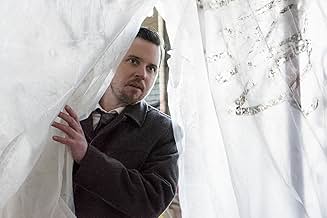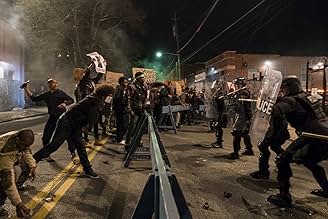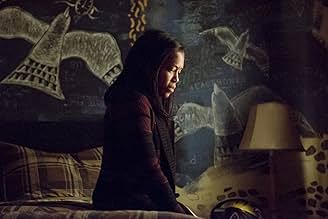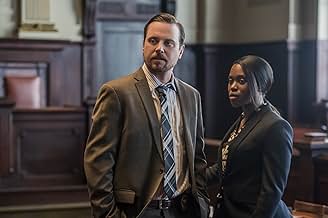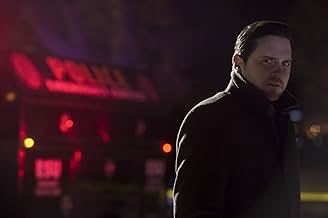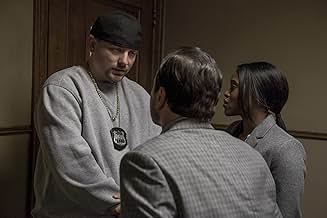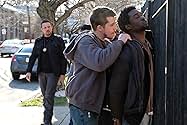Les tensions s'exacerbent à Jersey City lorsqu'un adolescent de la communauté afro-américaine est grièvement blessé par un policier.Les tensions s'exacerbent à Jersey City lorsqu'un adolescent de la communauté afro-américaine est grièvement blessé par un policier.Les tensions s'exacerbent à Jersey City lorsqu'un adolescent de la communauté afro-américaine est grièvement blessé par un policier.
- A remporté 1 prix Primetime Emmy
- 8 victoires et 12 nominations au total
Parcourir les épisodes
Avis en vedette
If you watch a lot of good television, you will recognize this as one of the best. Intensely touches on the issue of race, relationships, and death. Heart-wrenching. Phenomenal, and most importantly believable acting. The episodes are sort of like a novel, you don't want to put them down.
We say, I say, again and again that we are in a Golden Age of Television.
We say it and I say it because it is very true.
Television shows, spurred on by streaming apps and audience expectation being raised higher and higher, have become as good and often better than anything that film can offer.
The problem for shows and audiences alike however is that so many superb shows can get lost in the shuffle and even, as we saw so recently with Damnation and Dirk Gently, get cancelled long before they should be.
Hopefully Seven Seconds does not fall into the latter category.
Created, and largely written by Veena Sud, best known for her work on The Killing, (She's also from Toronto. I need to mention this because I too live in Toronto and because it is so nice to see a Canadian Woman, particularly one from so close to home, finding such success.) Seven Seconds is better than just good.
It's great.
Sud does a masterful job of writing and the shows itself is so layered with thought and imagery that I just had to go back and watch it again right away, something I have only done once, maybe twice before.
On the surface Seven Seconds is a very intense and dark story about a young white cop who hits a black boy and then, along with three other cops who he barely knows on a narcotic squad that he has just joined, seeks to cover it up.
On the surface Seven Seconds is a contemplation of race relations and the police.
But it is so much more than just that.
Seven Seconds is a deep and profound psychological and social study. It is a show that questions how well we really know each other, and how easily that we can assume that we know each other. It is a study of repentance and sorrow. It is a quest to see the humanity that underlies the surface in each and everyone of us.
Yes, it's another cop show.
And, taken on that level, it is a damned good cop show.
Yes, it is a story about crime and punishment, or lack of thereof.
Taken on just that level, it is a superb presentation of the impact of crime and on each every person that crime touches.
Yes, it is dark and moody drama.
Taken on just that level, Seven Seconds' superb writing and exquisite acting stands up with the best drama. Each and every actor is so perfect. Each and every bit of dialogue is so dead on. Each and every scene evokes and rips at your emotions so terribly and so beautifully.
Seven Seconds is simply and utterly perfect at what it does in that very rare way that shows like Rectify or NYPD Blue have been able to be.
Watch Seven Seconds.
And then watch Seven Seconds again to see how well symbols are used to create depth, how layered and complex this show is underneath what seems like a pretty straight forward exterior.
Because that is exactly what Seven Seconds really turns out to be about.
What we see on the surface does not tell us what lies hidden beneath.
But even on the surface Seven Seconds is a superb show.
Don't let it get lost.
Don't wait until it's been cancelled to find out how good this show is.
Enjoy all your other favourite shows too.
But, for your own sake, make sure you don't lose sight of Seven Seconds.
Seven Seconds centers on a Jersey City PD narcotics team, and their possible cover-up of the hit and run of a black teenage boy. The team is headed by Sgt. Mike DiAngelo (a chilling David Lyons), resilient and respected among his team, and officers within the department. Mike, who has no children of his own, takes young, and mostly naïve, officers under his wing and shows them the ropes with some tough-love and conditioning. Think Denzel Washington's character in Training Day and you'll get a really good idea of Mike DiAngelo's personality.
DiAngelo's newest recruit is the young, soon-to-be-a-daddy, Pete Joblonski, a cop transferred in from a "better part of the city", at DiAngelo's behest. The two share a loose familial bond; but that's enough for DiAngelo to vouch for Pete and to know that he can trust him to fall-in-line when needed. Narc veterans "Manny" Gary Wilcox (a convincing Patrick Murney) and Felix Osorio (a shining Raúl Castillo) round-out the four-man Special Investigations and Gang Unit of the JCPD. This team will do virtually anything for their leader...no, scratch that, will do anything at all for DiAngelo. He is a god in their eyes.
It's the early-morning hours after Valentines Day, and Pete is rushing to the hospital to meet his pregnant wife. The roads are slick, the snow is falling. Pete is distracted on the phone. Without a visible cue to the audience, Pete slams on the breaks and wipes out. He's fine, but what's under the car is not. Thankfully, we're spared from the gory view. All we see is a bicycle tire spinning, and a homemade paper seagull attached to the frame...the significance of which becomes quite compelling when we do learn the nature of the two.
The driver of the bicycle is a young, black teenager named Brenton; a suspected "banger" from Jersey City's most feared gang. DiAngelo, with the rest of his team in the backseat of his seized-from-a-drug-dealer sports car, arrive on scene to find Pete still behind the wheel of his slightly damaged SUV, and a blood trail leading to a ditch. It's one's moral duty to render aid to someone who is injured. This thought would cross anyone's mind when seeing someone critically hurt, but a cop....well, they're obligated to help.
DiAngelo follows the blood trail to a ditch where he finds Brenton's broken body, and a serious pool of blood. What does he do? What any selfish cop would do. Fearing an incredible backlash from the (mostly black) community over the recklessness of a white cop's actions against a black kid, DiAngelo orders Pete to leave the scene, and instructs the rest of the team to clean up the evidence. Forget about the kid in the ditch, "He's nothing."
The boy's parents, devoted and pious Latrice and Isiah Butler (the brilliant Regina King and the marvelous Russell Hornsby) also become victims - right from the get go. Victims of an anachronistic system where the black population are at a disadvantage starting from birth. Does anyone care about their rights? Does anyone care about Brenton? As the story plays out over the full 10-episodes, we discover the answers to those questions and get an intimate look at why "Cops don't go to jail", especially if the victim is black.
The series has many twists and turns, most will be of the "blind-sided" type. This isn't your typical, "I know what's coming next" kind of plot, even though the story may seem similar to you. For whatever reason, we have this insatiable appetite for police procedural TV, going back at least 60-years with "77 Sunset Strip" (1958 - 1964). Hawaii Five-0, Hill Street Blues, Miami Vice, Law and Order, LA Law, CSI, to name a few more. Certainly, there are a lot of shows on TV that "play the race card" and attack police for their bias. I admit I was a little skeptical of Seven Seconds at first because of that. Like those silly "coming of age" movies I'm so sick of watching, has this topic not been done enough? Are we not yet bored by dramatizations of white vs. black, race on race, BS shows? Why do we need to see another?
According to one website, of the last two-decades, ¼ of the top-40 shows on television are police-procedural. I've seen them all (shows like NYPD Blue, Law and Order, Homeland, The Wire) and there isn't a single show within the group of 10 that, at some point, didn't deal with race-relations and police bias. Most were fictional, some based on true events. The sad truth is, without real life stories, the writers would have nothing to write about, and we'd have a lot less TV to watch.
There is an element of truth to Seven Seconds. The series seems plausible, especially to those (black or white) who have had some dealings with the law. Mentions of the Ferguson, Missouri shooting come up, as do other similar real-life occurrences that have happened. We are reminded, again, of how archaic some things, some people are. Sadly.
This series is powerful, and moving, make no mistake. The characters are deep and complex. They have flaws and secrets. They are like you, me, and our neighbor. The production value is what you would expect from Netflix; no expense is spared to make everything as realistic as possible.
A favorite quote of mine is by Dante. It goes, "The darkest places in hell are reserved for those who maintain their neutrality in times of moral crisis."
That moral crisis is race relations within our own community, specifically with police. This has always been an issue during my lifetime (I'm middle-aged), as it was during my parents' and my grandparents'. Whether the place you call home is Jersey City, or Ferguson, or where I'm from, we have all seen parts of "Seven Seconds" play-out in real life. I know I have, in more ways than one. That's what makes this series hurt so much.
DiAngelo's newest recruit is the young, soon-to-be-a-daddy, Pete Joblonski, a cop transferred in from a "better part of the city", at DiAngelo's behest. The two share a loose familial bond; but that's enough for DiAngelo to vouch for Pete and to know that he can trust him to fall-in-line when needed. Narc veterans "Manny" Gary Wilcox (a convincing Patrick Murney) and Felix Osorio (a shining Raúl Castillo) round-out the four-man Special Investigations and Gang Unit of the JCPD. This team will do virtually anything for their leader...no, scratch that, will do anything at all for DiAngelo. He is a god in their eyes.
It's the early-morning hours after Valentines Day, and Pete is rushing to the hospital to meet his pregnant wife. The roads are slick, the snow is falling. Pete is distracted on the phone. Without a visible cue to the audience, Pete slams on the breaks and wipes out. He's fine, but what's under the car is not. Thankfully, we're spared from the gory view. All we see is a bicycle tire spinning, and a homemade paper seagull attached to the frame...the significance of which becomes quite compelling when we do learn the nature of the two.
The driver of the bicycle is a young, black teenager named Brenton; a suspected "banger" from Jersey City's most feared gang. DiAngelo, with the rest of his team in the backseat of his seized-from-a-drug-dealer sports car, arrive on scene to find Pete still behind the wheel of his slightly damaged SUV, and a blood trail leading to a ditch. It's one's moral duty to render aid to someone who is injured. This thought would cross anyone's mind when seeing someone critically hurt, but a cop....well, they're obligated to help.
DiAngelo follows the blood trail to a ditch where he finds Brenton's broken body, and a serious pool of blood. What does he do? What any selfish cop would do. Fearing an incredible backlash from the (mostly black) community over the recklessness of a white cop's actions against a black kid, DiAngelo orders Pete to leave the scene, and instructs the rest of the team to clean up the evidence. Forget about the kid in the ditch, "He's nothing."
The boy's parents, devoted and pious Latrice and Isiah Butler (the brilliant Regina King and the marvelous Russell Hornsby) also become victims - right from the get go. Victims of an anachronistic system where the black population are at a disadvantage starting from birth. Does anyone care about their rights? Does anyone care about Brenton? As the story plays out over the full 10-episodes, we discover the answers to those questions and get an intimate look at why "Cops don't go to jail", especially if the victim is black.
The series has many twists and turns, most will be of the "blind-sided" type. This isn't your typical, "I know what's coming next" kind of plot, even though the story may seem similar to you. For whatever reason, we have this insatiable appetite for police procedural TV, going back at least 60-years with "77 Sunset Strip" (1958 - 1964). Hawaii Five-0, Hill Street Blues, Miami Vice, Law and Order, LA Law, CSI, to name a few more. Certainly, there are a lot of shows on TV that "play the race card" and attack police for their bias. I admit I was a little skeptical of Seven Seconds at first because of that. Like those silly "coming of age" movies I'm so sick of watching, has this topic not been done enough? Are we not yet bored by dramatizations of white vs. black, race on race, BS shows? Why do we need to see another?
According to one website, of the last two-decades, ¼ of the top-40 shows on television are police-procedural. I've seen them all (shows like NYPD Blue, Law and Order, Homeland, The Wire) and there isn't a single show within the group of 10 that, at some point, didn't deal with race-relations and police bias. Most were fictional, some based on true events. The sad truth is, without real life stories, the writers would have nothing to write about, and we'd have a lot less TV to watch.
There is an element of truth to Seven Seconds. The series seems plausible, especially to those (black or white) who have had some dealings with the law. Mentions of the Ferguson, Missouri shooting come up, as do other similar real-life occurrences that have happened. We are reminded, again, of how archaic some things, some people are. Sadly.
This series is powerful, and moving, make no mistake. The characters are deep and complex. They have flaws and secrets. They are like you, me, and our neighbor. The production value is what you would expect from Netflix; no expense is spared to make everything as realistic as possible.
A favorite quote of mine is by Dante. It goes, "The darkest places in hell are reserved for those who maintain their neutrality in times of moral crisis."
That moral crisis is race relations within our own community, specifically with police. This has always been an issue during my lifetime (I'm middle-aged), as it was during my parents' and my grandparents'. Whether the place you call home is Jersey City, or Ferguson, or where I'm from, we have all seen parts of "Seven Seconds" play-out in real life. I know I have, in more ways than one. That's what makes this series hurt so much.
Great show with amazing actors. Usually I like to single out faves but honestly there isn't a bad performance here. But like some of the other reviews mention it's heavy, painful. A powerful look at personal and institutional racism in USA
This story arc would have been better served if it transpired over a tighter six episodes. In so many episodes, the story is allowed to wander. The side roads are interesting (and contain some of the very best acting, especially from Regina King and Russell Hornsby), but they distract from the main story line.
I found that I could not draw a parallel between a real life white police officer shooting an unarmed young black man in the back with a fictional white police officer driving in a bad snowstorm, while taking a frantic call his wife is going into early labor, accidentally hitting and killing a black teen on a bike. The real-life event, murder; the fictional event that drives the series, an unfortunate accident. This was the wrong plot device if the show meant to make a really strong statement about police killings of young black males.
I like Veena Sud's flawed heroines, both in The Killing and here. Personally, I'm all done with the male antiheros littering TV. I now find them boring and unwatchable. I only wish the KJ character here didn't clean up so good between her bouts of binge drinking. She seemed too clean and healthy when she was sober. I've known a couple of alcoholic women and they never could quite pull themselves together when sober. Even at their best, you could see them desperately trying to hold on. But not KJ. She seems at times like two different characters. I don't know if the flaw is in the writing or the acting. But honestly, I think a stronger actress could have been cast in the role.
For what it's worth, I never watched The Killing when it was broadcast (had no TV at the time), so I later stream binged it. I had no problems with the end of the first season, probably because I immediately went from watching the last show of the first season to watching the first show of the second. It likely played much better that way. So animosity about that show was absent from my viewing of this one.
I found that I could not draw a parallel between a real life white police officer shooting an unarmed young black man in the back with a fictional white police officer driving in a bad snowstorm, while taking a frantic call his wife is going into early labor, accidentally hitting and killing a black teen on a bike. The real-life event, murder; the fictional event that drives the series, an unfortunate accident. This was the wrong plot device if the show meant to make a really strong statement about police killings of young black males.
I like Veena Sud's flawed heroines, both in The Killing and here. Personally, I'm all done with the male antiheros littering TV. I now find them boring and unwatchable. I only wish the KJ character here didn't clean up so good between her bouts of binge drinking. She seemed too clean and healthy when she was sober. I've known a couple of alcoholic women and they never could quite pull themselves together when sober. Even at their best, you could see them desperately trying to hold on. But not KJ. She seems at times like two different characters. I don't know if the flaw is in the writing or the acting. But honestly, I think a stronger actress could have been cast in the role.
For what it's worth, I never watched The Killing when it was broadcast (had no TV at the time), so I later stream binged it. I had no problems with the end of the first season, probably because I immediately went from watching the last show of the first season to watching the first show of the second. It likely played much better that way. So animosity about that show was absent from my viewing of this one.
Le saviez-vous
- AnecdotesAccording to series creator Veena Sud, the choice of the particular New Jersey location was intentional because the rear view of the Statue of Liberty was somewhat symbolic of how welcoming 'she' is to immigrants from Europe and the East, and how ironic it is that her back is turned to those already settled here, particularly those in dire need of justice in this storyline.
- ConnexionsFeatured in The 70th Primetime Emmy Awards (2018)
Meilleurs choix
Connectez-vous pour évaluer et surveiller les recommandations personnalisées
- How many seasons does Seven Seconds have?Propulsé par Alexa
Détails
- Date de sortie
- Pays d’origine
- Site officiel
- Langue
- Aussi connu sous le nom de
- Bảy Giây
- Lieux de tournage
- sociétés de production
- Consultez plus de crédits d'entreprise sur IMDbPro
- Durée1 heure
- Couleur
- Rapport de forme
- 2.00 : 1
Contribuer à cette page
Suggérer une modification ou ajouter du contenu manquant







